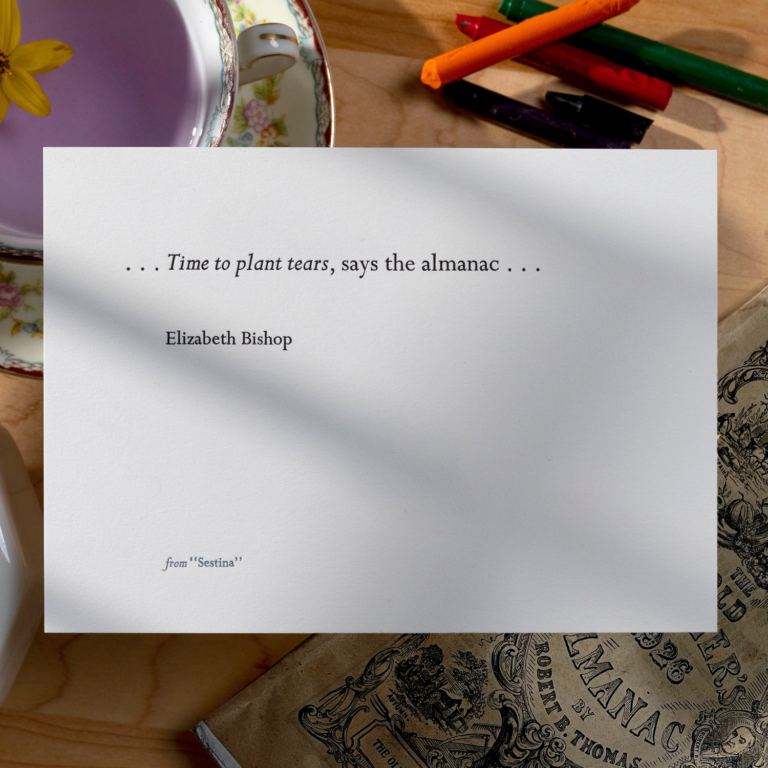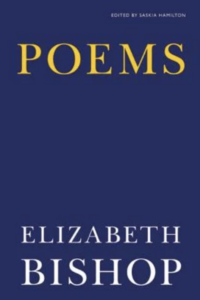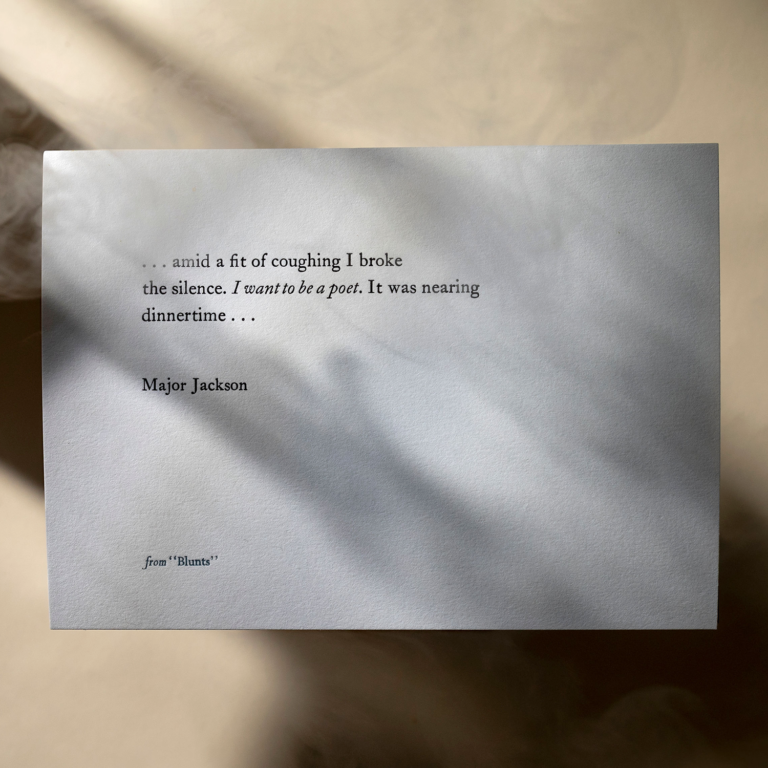Elizabeth Bishop
Sestina
This sestina poem considers a scene from Elizabeth Bishop’s own childhood through the sounds of six repeating words: house, grandmother, child, stove, almanac, tears. These six words repeat — in different order — as the final words of the poem’s lines, creating a kind of contemplation on how those repeated words informed her childhood: a childhood marked by loss, displacement, and a kind grandmother. “Time to plant tears” the poem states, in one of its most famous lines, as if the scene recalled has information about the future.

Letterpress prints by Myrna Keliher | Photography by Lucero Torres
Guest

Elizabeth Bishop was an American poet and writer. She served as Consultant in Poetry to the Library of Congress from 1949 to 1950, was the Pulitzer Prize winner for Poetry in 1956, and won the National Book Award in 1970.
Transcript
Pádraig Ó Tuama: My name is Pádraig Ó Tuama, and when I think back on myself as a child, I can sometimes think back on the ways within which I was always fantasizing about growing up or getting out of our village or running away or not being who I thought I was. And I suppose that’s part of every childhood. But sometimes I think, if I were to speak to that child, I’d speak to that child with respect, saying that the things you’re using to cope now are things that will be you for the rest of your life. I have conversations with that child from time to time, and I’m curious about what he sees. And every now and then, I feel like I’m still him.
[music: “Praise the Rain” by Gautam Srikishan]
“Sestina” by Elizabeth Bishop:
“September rain falls on the house.
In the failing light, the old grandmother
sits in the kitchen with the child
beside the Little Marvel Stove,
reading the jokes from the almanac,
laughing and talking to hide her tears.
She thinks that her equinoctial tears
and the rain that beats on the roof of the house
were both foretold by the almanac,
but only known to a grandmother.
The iron kettle sings on the stove.
She cuts some bread and says to the child,
It’s time for tea now; but the child
is watching the teakettle’s small hard tears
dance like mad on the hot black stove,
the way the rain must dance on the house.
Tidying up, the old grandmother
hangs up the clever almanac
on its string. Birdlike, the almanac
hovers half open above the child,
hovers above the old grandmother
and her teacup full of dark brown tears.
She shivers and says she thinks the house
feels chilly, and puts more wood in the stove.
It was to be, says the Marvel Stove.
I know what I know, says the almanac.
With crayons the child draws a rigid house
and a winding pathway. Then the child
puts in a man with buttons like tears
and shows it proudly to the grandmother.
But secretly, while the grandmother
busies herself about the stove,
the little moons fall down like tears
from between the pages of the almanac
into the flower bed the child
has carefully placed in the front of the house.
Time to plant tears, says the almanac.
The grandmother sings to the marvelous stove
and the child draws another inscrutable house.”
[music: “Every Place We’ve Been” by Gautam Srikishan]
Elizabeth Bishop was an American poet, and she was alive from 1911 to 1979. And this is a poem from her book Questions of Travel, which was published in 1965. This poem is called “Sestina.” It was originally called “Early Sorrow,” and Elizabeth Bishop was a private person, so maybe she thought that “Early Sorrow” was a little bit too obvious a title, and perhaps a little bit too close to the bone a title. I don’t know why she changed it. Anyway, she changed it to “Sestina,” and sestina, it’s an Italian word and it comes from the word for six. And it’s a particular form, a type of poem. A sestina has six six-line verses, and then it’s got a seventh, shorter verse. And the thing that governs these six six-line verses is that there are six words, and those words appear at the end of every line in each stanza.
The best way to understand a sestina is to know what the six words are. And in Elizabeth Bishop’s poem, the six words are “tears,” “almanac,” “grandmother,” “stove,” “child,” “house.” And when you hear the poem a second time, you’re able to hear how the entire poem is structured around these six words. She’s looked at a period of time in her life, a period of difficulty, and she’s distilled that period of difficulty into six words.
And a sestina begins, really, by choosing six words and then by working backwards, knowing that this is going to be the thread that holds the whole poem together, and then thinking, what other words can I use that will continually bring me back, time and time again, through different lines and different approaches, to these six words?
[music: “KeoKeo” by Blue Dot Sessions]
Elizabeth Bishop’s father had died when she was only eight months old. And then about three years later, her mother had a complete breakdown and was institutionalized for the rest of her life. They were estranged, really; I don’t think they ever met again during the rest of Elizabeth Bishop’s life. And so Elizabeth was sent to live with her mother’s mother in Nova Scotia. Now, her mother’s side of the family didn’t have much money; her father’s side of the family were more wealthy, and so she was living in Nova Scotia during a time that was a really happy period for her, but it was a poor childhood. And it was very loving. But then later on, there was a custody battle, and her father’s parents won custody. But she was unhappy living with that set of grandparents, so she was sent to live with an aunt, back on her mother’s side. And it was that aunt who introduced Elizabeth Bishop to poetry.
And then at 15, she was sent to boarding school, and then later on, she went to university, to Vassar. And she went on to become one of the most famous American poets of the 20th century. She was poet laureate for a year — it wasn’t called that then, but it was the same function — for the American state. And she won the Pulitzer Prize and the National Book Award, too.
This, then, is a poem from that extraordinary poet, who was often really private about a really particular time of her life. And she had originally called the poem “Early Sorrow,” which makes so much sense. But perhaps, maybe because she was so private, she wanted to have a more formal title, a title that’s just the name of the form of the poem that this is: “Sestina,” a meditation on six words, six words from her life.
[music: “Dirty Wallpaper” by Blue Dot Sessions]
So this poem mentions an almanac. And an almanac is kind of like a book that has calendars in it. You know, it’s got information about tides and the moons and seasons, and information about the best time to plant certain crops or seeds. It’s got information about festivals that are coming up. An almanac gives certain information about the year.
And then in the poem, too, there’s the kettle. And the kettle sings, and it spits, and the droplets of water “dance” on the stove. The elements that she’s looking at in this poem take on a life of their own. The almanac hangs, “birdlike.” It’s got a string that it hangs from above the stove, because it was so regularly consulted. It probably had some recipes in it, or ideas about things to get prepared in order to have a more fruitful next season. The almanac speaks, as well, and the stove speaks. And then the ink moons from the lunar calendar in the almanac fall down and go into the picture that the child has drawn.
There’s so much happening in the context of this poem, on the one hand it being thoroughly and utterly rooted in the ordinary, and then alongside that, there’s something almost magic-like about the ways within which these particular things in this kitchen take on a somewhat supernatural capacity, in order to be able to speak for themselves.
“Time to plant tears” is one of the most famous lines of this poem. And why? Why would it be time to plant tears? Because typically, an almanac would say things like time to plant strawberries or time to plant potatoes or time to sow this or time to dig up this. Why would she have written into her life that this period of time was time to plant tears? This child doesn’t seem to know the custody battle that’s going to come or the relocation back to her other grandparents and then the further relocation to her aunt — and that time wasn’t always happy, either — and then boarding school and university.
And strangely, in the poem, she draws the father, but there’s no mention of her own mother. This child is living with so much loss. This child, through her art, has a profound knowledge of something that’s in the atmosphere, coming towards her.
[music: “First Grief, First Air” by Gautam Srikishan]
Elizabeth Bishop’s adult life had a lot of chaos to it. She, in love, as well as in addiction, continued to cope with an extraordinary kind of difficulty throughout her life. But amazingly, in her life, it was her capacity to step away from some of the chaoses that she carried and to write poems of extraordinary noticing, of profound simplicity and a kind of a steely-eyed gaze of observation, that typified her.
And that, coming from somebody who lived a life that was so tossed and torn by grief, and then other people’s anxieties about where this child should live, that is a demonstration that art, for her, was always a steadying thing, even in the middle of chaos. And that can be so true for so many of us, that in the middle of the chaoses of our lives that there has been something — painting, music, walking, animals, writing, reading — something — that holds us steady in the midst of things that we aren’t able to control.
[music: “Tripoli” by Blue Dot Sessions]
Partly why I like sestinas so much is because any of us could look at a period of our life and think, What six words would I choose, if I were to describe that year, or that time we moved to that house, or that time I went to that new school, or that time on the school bus, on the way to school? Whatever. You can just think, what would the six words be?
And that’s the real intelligence of a form of poetry like this. It’s not just a clever exercise. It asks you to say, If I thought about a particular period of my life, what six words would do for me, for holding it together? Some of them happy, some of them sad, some of them complex, some of them about the future, some of them about the past — what six words would I choose?
[music: “Tripoli” by Blue Dot Sessions]
“Sestina” by Elizabeth Bishop:
“September rain falls on the house.
In the failing light, the old grandmother
sits in the kitchen with the child
beside the Little Marvel Stove,
reading the jokes from the almanac,
laughing and talking to hide her tears.
She thinks that her equinoctial tears
and the rain that beats on the roof of the house
were both foretold by the almanac,
but only known to a grandmother.
The iron kettle sings on the stove.
She cuts some bread and says to the child,
It’s time for tea now; but the child
is watching the teakettle’s small hard tears
dance like mad on the hot black stove,
the way the rain must dance on the house.
Tidying up, the old grandmother
hangs up the clever almanac
on its string. Birdlike, the almanac
hovers half open above the child,
hovers above the old grandmother
and her teacup full of dark brown tears.
She shivers and says she thinks the house
feels chilly, and puts more wood in the stove.
It was to be, says the Marvel Stove.
I know what I know, says the almanac.
With crayons the child draws a rigid house
and a winding pathway. Then the child
puts in a man with buttons like tears
and shows it proudly to the grandmother.
But secretly, while the grandmother
busies herself about the stove,
the little moons fall down like tears
from between the pages of the almanac
into the flower bed the child
has carefully placed in the front of the house.
Time to plant tears, says the almanac.
The grandmother sings to the marvelous stove
and the child draws another inscrutable house.”
[music: “Praise the Rain” by Gautam Srikishan]
Chris Heagle: “Sestina” comes from Elizabeth Bishop’s book Questions of Travel. Thank you to Farrar, Straus, and Giroux, who gave us permission to use Elizabeth’s poem. Read it on our website, at onbeing.org.
Poetry Unbound is: Gautam Srikishan, Erin Colasacco, Eddie Gonzalez, Lilian Vo, and me, Chris Heagle.
Our music is composed and provided by Gautam Srikishan and Blue Dot Sessions.
This podcast is produced by On Being Studios, which is located on Dakota land. We also produce other podcasts you might enjoy, like On Being with Krista Tippett, Becoming Wise, and This Movie Changed Me. Find those wherever you like to listen, or visit us at onbeing.org to find out more.
Books & Music
Recommended Reading
The On Being Project is an affiliate partner of Bookshop.org and Amazon.com. Any earnings we receive through these affiliate partnerships go into directly supporting The On Being Project.







